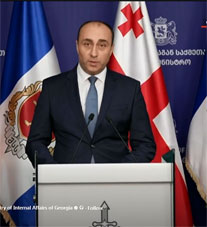
Tbilisi Court Jails 14 More Over Election-Day Clashes, Frees Activist on Bail
By Liza Mchedlidze
Monday, October 20, 2025
A Tbilisi court has ordered pre-trial detention for 14 individuals accused of involvement in the violent unrest that broke out on October 4, while releasing activist Mariam Mekantsishvili on bail. The ruling brings the number of people held in custody over the incident to 58, including several identified as protest organizers.
The hearings came after Interior Minister Geka Geladze announced new arrests linked to the clashes, which occurred during Georgia's disputed municipal elections. Authorities say the unrest began when demonstrators tried to force their way into the presidential palace in central Tbilisi. Police responded with water cannons, tear gas, and pepper spray, accusing the crowd of attacking officers and damaging property.
The Prosecutor's Office later filed charges against multiple suspects, citing attempts to seize government property and organize group violence. Mekantsishvili was accused of coordinating protesters and encouraging confrontation with police. She was charged under a provision that criminalizes organizing actions that disturb public order, which carries a penalty of up to three years in prison. Prosecutors allege she helped mobilize people from an office on Rustaveli Avenue, leading to further clashes near the presidential palace.
Nine of the detainees, including Iuri Lomidze, Giorgi Talakhadze, and Gia Toloraia, face charges of participating in group violence, which is punishable by up to six years in prison. Five others, among them Temur Kurtsikidze and Genadi Kelikhashvili, are accused of attempting to seize a strategic facility in addition to group violence charges.
Former police officer Irakli Shaishmelashvili, who resigned from the Interior Ministry's Special Tasks Department last year and later left Georgia, has been charged in absentia. Prosecutors claim he urged supporters to resist law enforcement and called for the violent overthrow of the government ahead of the October 4 unrest.
Government officials have described the events as part of an attempted coup supported by foreign actors. Opposition groups and rights organizations, however, argue that the charges are politically motivated and intended to stifle dissent after months of anti-government demonstrations.
The October 4 clashes occurred amid growing tensions over Georgia's democratic trajectory and its stalled path toward European integration. Protesters accuse the ruling Georgian Dream party of consolidating power and undermining civil freedoms, while the government maintains that it is protecting public order and national security.

